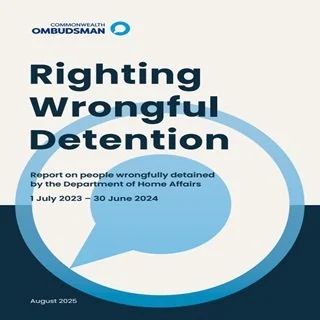By The Office of the Commonwealth Ombudsman
This report is part of the Ombudsman's ongoing own motion investigation into instances where the Department of Home Affairs (the Department) has detained people it suspects to be unlawful non-citizens, but later identifies they were not unlawful and releases them from detention. It covers 11 cases of wrongful detention the Department identified between 1 July 2023 and 30 June 2024, including the wrongful detention of an Australian citizen. In one case, the person was wrongfully detained for one year and six months. Under section 189 of the Migration Act 1958 (the Act) an officer must detain a person they 'know or reasonably suspect' to be an unlawful non-citizen. While a decision to detain a person may have been lawful because an officer held the required reasonable suspicion at the time, in each of the cases considered in this report, their detention was wrong because that suspicion was later found to be incorrect. Wrongfully depriving a person of their liberty is serious. We commend the Department’s commitment to continually improving its policies and procedures to mitigate the risk of wrongful detention. However, since we began monitoring the issue in 2005, we have observed the same types of errors are causing people to be wrongfully detained. In addition, the Department has not improved the way it addresses its mistakes with the individuals it has wrongfully detained. The Department does not offer people it has wrongfully detained any form of redress, formal apology, or financial compensation. Although the Department may identify and acknowledge the mistake to the individual, the onus is on the individual to navigate the complex and often costly process of lodging a civil claim to seek damages for unlawful detention through the judicial system. Furthermore, because affected individuals are only informed verbally (rather than in writing) that an error has occurred on their release, they may not be aware of their ability to make such a claim or have access to the information required to support it. Of the 11 individuals who were wrongfully detained in this reporting period, only one has made a civil claim for unlawful detention.
Canberra: The Office of the Commonwealth Ombudsman, 2024. 35p.




